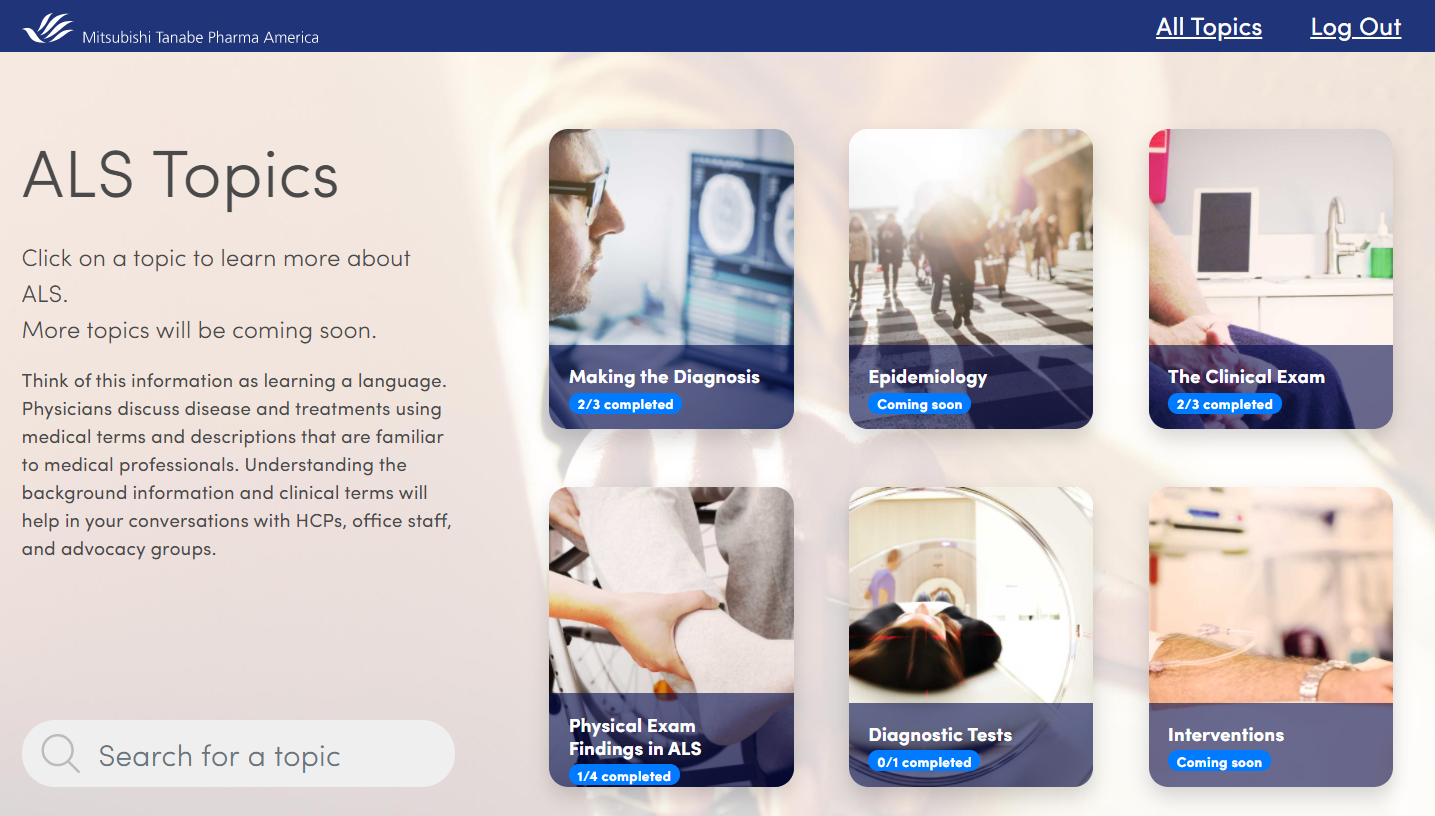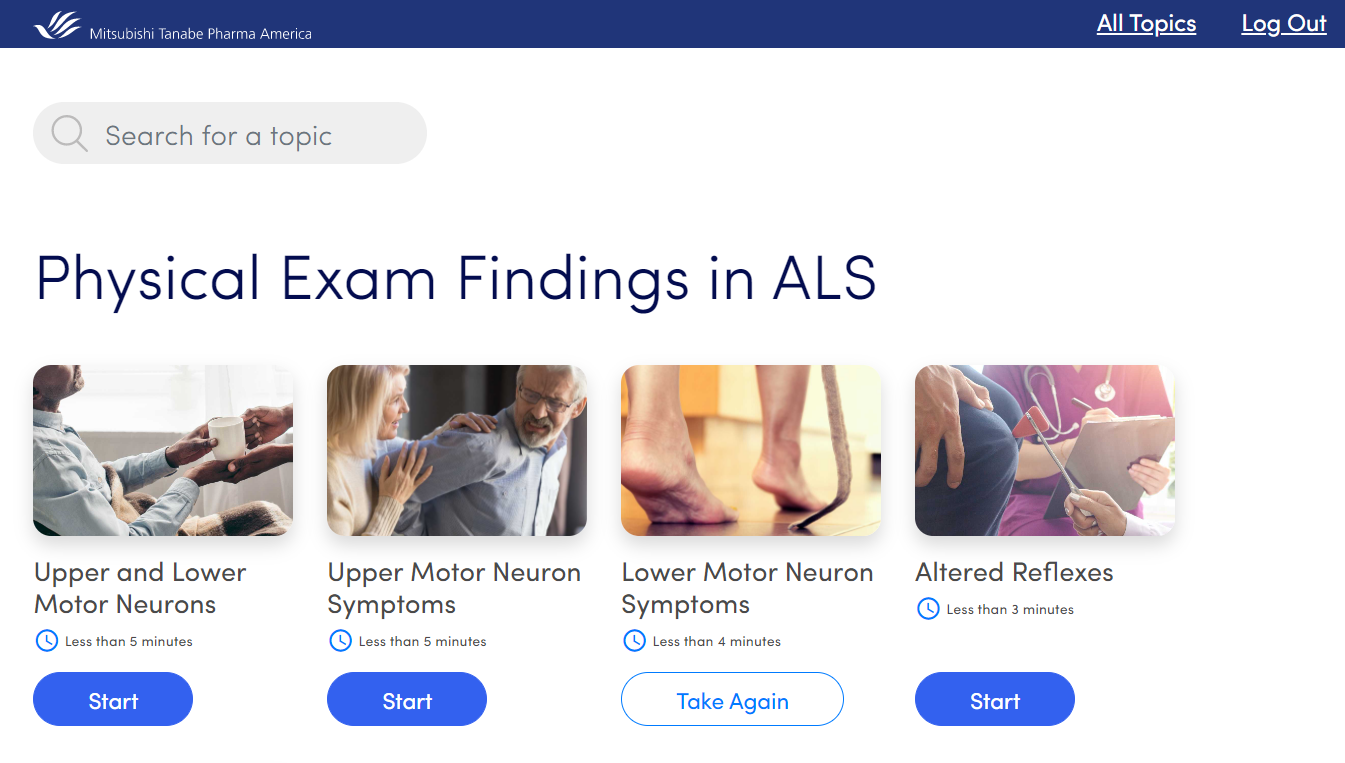

How do you prioritize training topics in an L&D department of one?
How do you add value to a tenured 40-person salesforce that’s been with your company since product launch?
What does training look like when you explore content delivery outside of an LMS?
In his two-and-a-half years as Commercial Training Lead at Mitsubishi Tanabe Pharma America, John Riggle’s answer to these questions is the ALS Knowledge Center. This user-friendly library of microlearning lessons addresses diagnostic processes, terminology, and interventions associated with ALS, Mitsubishi Tanabe Pharma America's sole area of focus.
While many pharmaceutical training teams can expect frequent product updates and new competitor insights, trainers in the rare disease space operate in a different ecosystem. Product development is slow: only two products have been FDA approved for the treatment of ALS in the last 50 years.
Riggle’s training approach focuses on lessons that elevate the veteran sales team’s understanding of ALS in a format that’s accessible and reps return to month after month. The Knowledge Center is a testament to the impact an L&D department of one can make when you truly understand the needs of your learner population and use internal resources in creative ways.
We recently sat down with Riggle to learn more about his role and recent work. Below are some excerpts from our conversation.
Set the stage for me: what’s the training environment like at Mitsubishi Tanabe Pharma America?
In our company we have one product. It's for ALS. We don't have a lot of product updates or activity in the ALS space. This means that we can only train on so much. We go through clinical trials that are underway. We go through handling objections. We go through our data to see if there's something new that we can share. We obviously train on soft skills. We train on any new marketing pieces. But beyond that, there aren’t a lot of new and different things for us to train on.
To me, the biggest thing that impacts training is when you look at the structure of your salesforce. We have a tenured salesforce – we don’t have anyone who doesn’t have pharma experience. Half of our team has been with us since product launch.
You know you don't want to insult people's intelligence, which I think sometimes you end up doing when you train soft skills. You want to make sure that you're elevating their skills.
Tell me where the idea for the ALS Knowledge Center came from.
The opportunity for the partnership with Bull City started with taking a look at the topics that we haven’t trained on in the past. What are some of the good-to-know things that might surface when you have a dialogue with a neurologist? When the neurologist goes, “I just did an EMG with a prospective ALS patient. We're waiting to find out some of the results.” Well, what's an EMG and why do you do it? And when do you do it and where do you do it?
We thought, let's try to fill in some of the gaps in the representatives’ knowledge and have these bite-sized learning modules that would address the kinds of comments that an ALS specialist would make in passing that a layperson wouldn’t understand.
We started to look at what does the actual diagnostic exam look like? What are some of the different tests that happen? Where does ALS most commonly first manifest itself? What are some of the areas of the body that are impacted and what does that impact look like?
What is the experience of using the Knowledge Center?
We wanted to scale the training down so it wasn’t a module that had a ton of disclaimers. We didn’t want to put it into a learning system where we covered 12 topics in a 40-page module.
We could have used our LMS, but that wasn’t the experience I wanted. Our LMS automatically generates a pretty sterile email -- “You’ve been assigned something new. Click here to complete it.”
I wanted users to get an email from me going “Hey everybody, we just launched a new module. This is what it's called. Click here -- it's just a website.”
When you click the link, it goes to a really cool landing page that says ALS Knowledge Center. So it already seems a little bit more geared toward training and education as opposed to the LMS, which is the same platform we use for policies and procedures generated through compliance.
It's just a better user experience and you can do it on your laptop, phone or iPad. You can do it whether you’re on our VPN or not. They’re 6-to-10-minute modules that are available to you wherever you’re at, at any time.
What kinds of feedback have you received from reps?
When we first launched the Knowledge Center it generated a lot of feedback, which was what we were expecting because it was something new and different. The true testament to it is the comments we receive now that the novelty has worn off. This gives us a better idea of actual usage and staying power.
What I like the most is that a person who has access to the modules for a year still sends me a message. One of our users sent me an email to say the training is so helpful when they’re sitting in an office or if they’re running early to an appointment. They call up the training and see what’s new. If it’s really helpful for them, they save the link on their phone.
To me, that’s mission accomplished.
It's like this is somebody who figured out that they don't have to do it. They want to do it. They figured out the ideal time to do it. And then they figured out a system to make it worthwhile.
There's no assessment. This isn't a mandatory training piece that you put on the LMS that everybody has to take. It’s like, do you want to give yourself an edge over other reps at other companies? Do you want to make sure you never have that deer in the headlights look? Click on the link.
How have you selected training topics for the Knowledge Center?
We have a conversation internally of where we'd want to focus and what do we think we'd want to offer our field team. It started off with an internal conversation between sales, marketing and training. Then we reached out to the field trainers and said, “These are the topics. What other things do you hear doctors say in passing that you don’t fully understand or you’d like more info on?”
In marketing we actually have a doctor on staff, so I asked her to help me understand these topics from a doctor’s perspective. How do doctors get trained on these topics? What comes first, second and third?
If you don’t have a doctor on staff, reach out to your subject matter experts or key opinion leaders on the sales side. Say, “These are the topics we want to train on. Help us prioritize.” This helps us train on each topic as completely as possible.
Do you have advice for other training departments of one?
Partner with people that you believe in -- people you know can deliver outstanding quality work. Bull City is an outstanding third-party vendor and you’ve proven that. I trust Vivian, Shantel, and Garry implicitly.
The other element is to leverage your internal subject matter experts whenever possible. Whether they’re in market access or medical or marketing, leverage the people who have some of the bench strength that you need.
Then you need to recognize them whenever possible. Give them credit and recognition. For example, if someone has helped you out during the year, make sure you provide feedback that demonstrates collaboration, especially when it comes time for annual performance reviews.
Also, I have field trainers, and you really need to maintain regular communication with them. Have bi-weekly or monthly calls with them. You need to give them things to work on. Use them as a sounding board. And honestly – I'm a big believer – you need to pay them. It doesn’t have to be a lot, but it’s that recognition component.
For the department of one, find out who you can recognize as honorary members of the training team.

